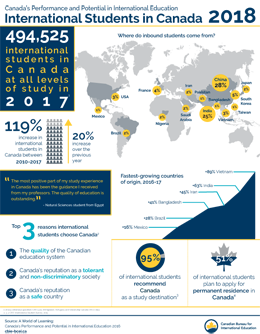Permanent residency, the goal for most foreign students

The majority of international students in Canada want permanent residency, a new survey has found.
Inside Higher Ed reported on the survey by the Canadian Bureau for International Education (CBIE), which found that 60 percent from this year’s cohort want to be future citizens, an increase from 51 percent who said the same in 2015. Another 30 percent said they were unsure.
These participants have further study and work plans for the immediate years after graduating from the course.
The number of international students in Canada reached a total of 494,525 by the end of 2017.
This number represents a 20 percent jump over 2016 and surpasses the Government of Canada’s International Education Strategy goal of 450,000 international students in Canada by 2022.
“Almost half of the students indicated their intention to remain in Canada in order to obtain further education. Students who wished to remain in Canada to study were most likely to pursue further education in a different institution (25 percent) while 21 percent indicated they would remain at their current institution,” the report wrote.
“Over two-thirds (70 percent) of all students indicated their intention to find work in Canada following their studies.”
The CBIE survey had 14,228 post-secondary international student respondents, representing four percent of the total for this cohort. More than one-third (35 percent) are pursuing a bachelor’s degree, while the rest comprise of students pursuing diploma studies (13 percent), Master’s (22 percent) and doctoral programs (17 percent). East Asian students form the largest regional group (23 percent), followed by South Asia (22 percent) and Africa (14 percent).
These students’ intention to remain in Canada should come as no surprise. For many years, the country maintained a reputation as a tolerant, open society with friendly immigration policies, even as its neighbour down south grew increasingly hostile towards international students.
One female business student from India said: “Canada is welcoming, friendly, and cheerful and that makes me feel good in spite of being thousands of miles away from home.”
Another student from Trinidad and Tobago said: “The startup community and faculty members are incredibly kind, empathetic and supportive people…Professionals both inside and outside the university whom I have had the pleasure to interact with continue to encourage me and help me where they can to pursue my goals and improve every day and that means the world to me.”
According to CBIE’s latest survey, Canada maintains very high levels of satisfaction among the international student cohort, with a 94 percent approval rate.
Ninety-four percent of respondents indicated they were very satisfied or satisfied with their Canadian education experience. The survey gathered information about the students' academic experiences, their participation in extracurricular activities, their housing and familial situations, their friendship circles and level of social integration, and their experiences working or looking for work in Canada, among other topics.
Slightly more than a third (35 percent) of the survey respondents were enrolled in programs at the bachelor’s level, 22 percent at the master’s level and 17 percent at the doctoral level, while most of the rest studied in certificate or diploma programs or English-language programs.
It’s resulted in a boom in the number of international students in recent years. Last November, Universities Canada reported a 10.7 percent increase in international student enrollment compared to last fall. British Columbia saw the largest increase, with a hike of 15.6 percent. Around the same time, American universities experienced a seven percent decline in new international enrollments.
Meanwhile, the C.D. Howe Institute reports that former international students are doing quite well in Canada’s job market compared to internationally educated immigrants but still fall behind their Canadian-born-and-educated counterparts.
In Comparing Outcomes: The Relative Job-Market Performance of Former International Students, authors Mikal Skuterud and Zong Jia Chen compared the performance of former international students (who studied within the first decade of the 2000s) in today’s job market with that of foreign-born-and-educated graduates as well as Canadian-born and educated people, combining data from Canada’s National Graduate Survey and Labour Force Survey.
The results indicate that former international students clearly outperform their foreign-educated counterparts by substantial margins, but they are not too far behind those born and educated in Canada.
Infographic - http://www.asianpacificpost.com/media/graphics/Infographic-inbound-EN_18-0913.pdf









